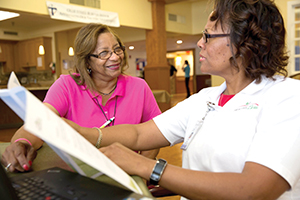By BETSY TAYLOR
As health care costs have risen in recent decades, workplace wellness programs have gained traction. Health care systems with lots of experience under their belts running workplace wellness programs succeed by tailoring their programs to meet employer and employee needs.

Tammy Kelly takes a yoga class in a Greenville County, S.C., office space. The class is part of Bon Secours St. Francis Health System's WorkWell offerings, provided to area businesses to support healthy employees.
Photo by Chris Taylor
New ventures, like the creation of a spin-off from Franciscan Missionaries of Our Lady Health System, seek to capitalize on robust demand for actionable data related to group health and wellness.
Workplace wellness offerings vary greatly from market to market and from employer to employer, but they often include lifestyle management — think smoking cessation, exercise and weight loss — and disease management that links employees to needed health care, coaching and education to better manage chronic disease.
Some providers who first offered occupational medicine to area businesses have expanded into increased wellness programming — and the ability to deliver services at the client's place of employment is a common thread among the programs.
Demand is strong
In a 2014 research brief, The RAND Corp., a nonprofit that conducts research related to public policy, called workplace wellness a $6 billion industry. RAND generally defines workplace wellness as "employer promotions and programs aimed at supporting healthy behavior and improving health outcomes among employees." Analysts put an $8 billion estimate on the industry in a 2016 Chicago Tribune story.
Those who lead workplace wellness offerings for Franciscan Missionaries of Our Lady Health System in Baton Rouge, La., Mercy Health — Toledo in Ohio, and Bon Secours St. Francis Health System in Greenville, S.C., spoke with Catholic Health World about the ways they've built successful workplace wellness business lines.
New venture
On April 4, a new health care company providing expertise in population health called inHealth Strategies became part of the La Palma, Calif.-based Innovation Institute. inHealth Strategies is a joint venture between the institute and Franciscan Missionaries of Our Lady Health System. (The Innovation Institute itself is owned by nonprofit health systems, including several Catholic health care systems.)
inHealth Strategies evolved from an FMOLHS subsidiary, Franciscan Health and Wellness Services, which focused on providing comprehensive health and wellness services through its Healthy Lives program.
inHealth Strategies employs eight clinicians, business analysts and data analysts. The company is consulting and partnering with health care organizations and employers around the country who hire inHealth to improve health outcomes within businesses and communities. inHealth Strategies offers population-based analytics, along with support for health risk assessments and screenings, health coaching and care management.

Mills
Dr. Stephanie Mills, the president of inHealth Strategies, was previously the chief executive of FMOLHS's Franciscan Health and Wellness Services. The health care system started its Healthy Lives program around 2010, to use best practices related to population health management and well-being and to apply those to the population covered by the system's self-insured health plan, which includes about 17,000 people. Mills said FMOLHS saw significant health costs savings — to the tune of about $20 million — since the Healthy Lives program began, and health improvements in its covered population.
Deep data dive
An employer working with a health care system to build a workplace wellness program generally starts with insurance claims and other data and conversations with system employees to identify areas of focus for health improvement. inHealth, for instance, focuses initial energy on helping an employer understand its employee population, using health plan claims data, clinical data and wellness data, including information derived from health risk assessments and screenings.
Mills said the data analysis allows employers to go past the surface layers, deep into financial utilization data, so they understand where the spending is occurring and what's driving it. For many employers the company contracts with, "it is a bit of a 'wow,'" she said.
The data provided to an employer is aggregated and redacted to maintain the privacy of individual employees. That addresses an ongoing concern by the public that offering health and wellness services through the workplace could compromise a person's privacy or make an individual a target if an employer is looking to cut health care costs.

Lonnie Claiborne, left, an employee at Ollie Steele Burden Manor Nursing Home in Baton Rouge, La., meets with nurse and health coach Pamela Quinn last year. Quinn was promoting employee wellness through Franciscan Health and Wellness Services' Healthy Lives program, a precursor to the work of inHealth Strategies.
Drawing on the data, inHealth Strategies can craft a corporate wellness program with measurable goals.
Mills said an employer may need to invest for three to five years to truly hardwire changes within an organization. Success, she said, is measured by a reduction in the amount the corporation spends on health care. She said clients served in 2015 by Franciscan Health and Wellness Services showed medical and pharmacy spending per member, per year was down 3 percent when the industry trend was an increase of about 8 percent. In 2016, comparable data showed a 1 percent decrease at a time the industry trend was a 5 percent increase, she said.
Meeting people where they are
Greg Crowe, director of business health services for Bon Secours St. Francis Health System, said that system's WorkWell health offerings include occupational health services in the workplace, such as providing physicals or specific health screenings required in certain industries, and workplace wellness services.
Crowe said in the Greenville area where Bon Secours St. Francis Health System operates, the market for occupational health is "growing with good pace," and that other workplace health offerings are showing moderate growth.
Bon Secours St. Francis employs 16 advanced practice providers who work on site in 14 different workplace clinics, and has seen success with an approach that begins with this on-site care. Crowe said every employer that has established a clinic through WorkWell has maintained the offering. He said the return on investment varies between employers, but the employers showed a range from $2.00 to $4.19 return for every dollar spent on employee health initiatives.
The county of Greenville began a contract with WorkWell about eight years ago, said Debra Ham, the county's director of human resources. Nurse practitioner Krishna Patel works on-site at two clinics where she is available for appointments for Greenville County's 2,800 employees. One clinic is in a county office building; the other is for employees of a detention center and law enforcement.
Many of the employees she works with stop in for episodic care, if they have, say, a sore throat or an eye infection. Three years ago, the county began offering biometric screenings, a health workup that includes a person's blood pressure and fasting sugar levels, to establish baseline data for employees on its health plan. Employees who are screened receive a $20 discount on their monthly insurance premiums.
If an individual's test results reveal a cause for concern, Patel or another clinic employee makes contact and can schedule an appointment with a Bon Secours physician. That physician may refer the patient back to the workplace clinic for follow-up care. Patel works to develop relationships with employees who need help managing chronic conditions.
Another part of Patel's job involves promoting a culture of health and wellness among county employees. She plans yoga and Zumba classes in space at a county office building and offers health education by posting health information, sending out emails and discussing different topics each month at the clinics. Patel said, "There are a lot of people that change for the better."
Tailoring to the audience
Mercy Health — Toledo in Ohio works with about 1,000 companies, including 500 year-round, to provide occupational medicine and/or workplace wellness services, said Marilyn Stoner, director of Mercy Health — Toledo occupational medicine.

Stoner
About half of the businesses contract with the health system for episodic care.Some jobs, like a transportation company, for instance, require medical examinations every year or every other year for employees. Some jobs involve the safe handling of potentially hazardous materials, like asbestos, so a Mercy Health occupational health employee visits the site to make sure proper safety equipment and procedures are in place. Mercy Health does not separate out its revenue related to its occupational health and workplace wellness offerings, she said.
She said employers that contract with Mercy Health — Toledo on workplace wellness services and education typically don't see return on their investment until their second or third year of working with the health care system.
Stoner encourages the employer to ask employees what they want to learn related to the physical, spiritual and recreational aspects of health and wellness. She said a plant with shift work may ask to have an expert from Mercy Health — Toledo's sleep center educate about good sleep habits. Spiritual programs involve encouraging people to cultivate healthy relationships in their lives. Mercy Health — Toledo also can bring in financial advisers when employees want to improve their financial literacy, such as knowing how to set up a household budget.
"We want to take care of the whole self, not just pieces of it," Stoner said.
Copyright © 2017 by the Catholic Health Association
of the United States
For reprint permission, contact Betty Crosby or call (314) 253-3490.